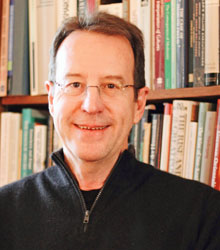German Professor Perry Myers Receives Fellowship for Research in France
November 25, 2019
By Jake Weber

Perry Myers joined the Albion College faculty in 2004. (Photo: Sunny Kim, ’20)
Perry Myers, professor of German at Albion College, left investment banking for education, and loves his job teaching college students. But he’s giving it up—temporarily—to spend a year in Paris, thanks to a prestigious research fellowship to the Institut d’Études Avancées de Paris for the 2020-21 academic year.
“This is the most significant research grant I have ever received and I am really excited about it,” says Myers.
The grant provides Myers with access to vast national archives, along with a furnished apartment in Paris and a stipend. Already under contract to write a book tentatively titled Spiritual Empires in Europe and India: Cosmopolitan Religious Movements and their National Factions, 1875-1918, Myers sees this fellowship as key to finishing his research for that project.
In the 19th and early 20th centuries, Myers says, new religious movements were developing across the globe. Focusing on England, Germany, France and India, Myers exposes patterns of how these newfangled movements shared ideas, yet diverged from each other once they became established in their various distinct cultures.
As an example, Myers notes that theosophy (the idea that there is a single core spiritual truth and all religions are a reflection of that truth) found traction in all four countries, but “quickly developed their own unique factions in each country,” Myers explains. “An important focus of my research is to explore how these movements engaged in domestic social and political issues. In India, for example, Indian theosophists were often involved in the independence movement against British colonial rule. My study emphasizes the tension between the global and the local dimensions of these movements, but also how their religious tenets intersected with the social and the political spheres in each country.”
The fellowship also provides the “last leg” of the comparative study. “I have done research at the British Library and worked on German sources in Frankfurt and Berlin. Most of the Indian sources are in English, because that was often the common language for Indians from different regions,” he says. “I have had only really short stints in France and those sections still need the most work.”
But while Myers is enthusiastic about the unparalleled resources, he’s equally excited about the opportunities to collaborate with some of the world’s most eminent scholars.
“The Institute in Paris is based on the Princeton model of Advanced Study and attracts scholars from elite universities across the entire world.” he says. “It’s a real honor for me to have the opportunity to work in that environment.”
It also gives Myers and Albion new networks for collaborative partnerships. “The personal connection is easier to develop when you’re there and you can drink coffee and go have lunch with other scholars. I’m most looking forward to developing those relationships.”